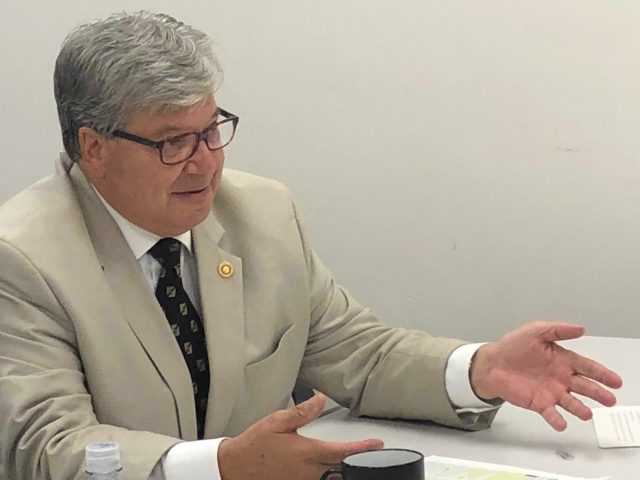This story, part of the I Am Madison project supported by Madison Community Foundation, was produced by a student reporter in the Madison365 Academy. To learn more or support our educational programs, visit madison365.org/academy.
 Tony Schiavo, a recent Italian immigrant, went pheasant hunting, because in 1918 pheasant and rabbit made up a good part of his family’s daily supply of food. He got lost in the Mount Horeb area, west of Madison. He came across the Foster Handle family dairy farm. He could hardly speak a word of English, was dying of thirst and met Cecelia Foster, who was only 15.
Tony Schiavo, a recent Italian immigrant, went pheasant hunting, because in 1918 pheasant and rabbit made up a good part of his family’s daily supply of food. He got lost in the Mount Horeb area, west of Madison. He came across the Foster Handle family dairy farm. He could hardly speak a word of English, was dying of thirst and met Cecelia Foster, who was only 15.
 “It was a love at first sight,” and they eloped a month later, says Madison’s Nino Amato, who is their grandson. Tony was Catholic, Cecelia was Protestant, and back then Protestants and Catholics both hated each other. “My great-grandmother refused to talk to her daughter for about 20 years. As time went on, everyone made amends, and everything was just fine,’’ said Nino. Tony and Cecilia went on to own the Stone Front Tavern on the corner of Regent and Francis, in the Greenbush Neighborhood.
“It was a love at first sight,” and they eloped a month later, says Madison’s Nino Amato, who is their grandson. Tony was Catholic, Cecelia was Protestant, and back then Protestants and Catholics both hated each other. “My great-grandmother refused to talk to her daughter for about 20 years. As time went on, everyone made amends, and everything was just fine,’’ said Nino. Tony and Cecilia went on to own the Stone Front Tavern on the corner of Regent and Francis, in the Greenbush Neighborhood.
The spot where Tony found his bride-to-be is now a park just on the eastern edge of downtown Mt. Horeb called Grandma Foster Park.

Amato grew up in Greenbush neighborhood here in Madison. His grandparents immigrant from Sicily, Italy to Madison. The website of the Greenbush-Vilas Partnership says Greenbush has been called “Madison’s Ellis Island.” It was, for many years, the point of entry for immigrants starting their way of path to success. Greenbush was once Madison’s most diverse neighborhoods, home to almost exclusively African American and Italian families.
“My grandfather used to tell me since they fled Italy, because of the fascism and the communism that was occurring throughout Europe, that it’s easy to identify bigotry and racism,” Amato says. A large group of immigrants came to Madison from a village outside of Palermo, Sicily. They were stone cutters and marble cutters who came here to help build the state capitol, which took about 10 years. These immigrants started to live in the Greenbush neighborhood. “Our community was, I thought, quite diverse and quite rich but it was considered to be poor,” says Amato. But he really felt blessed for growing up in Greenbush neighborhood.

“I consider being raised in a predominantly impoverished area as a blessing,” Amato says. “It gave me a set of values that most people could never experience. If they grew up in a predominately white rural area, or a predominantly urban area, without having the interaction of people from all sorts of different faiths, cultures, and races, they end up living in a bubble. That enriched me in the sense of really instilling my values about human rights and civil rights. It’s too bad most people aren’t growing up in an environment where it’s quite diverse. I don’t mean that as any cliché. When you’re exposed to different cultures, we are all human. We all bleed the same. We all care and have compassion. Those who live in a bubble, who have no compassion, and we’re seeing that in the White House, are disadvantaged, and they also turn out to be very threatening to who we are as a nation. I consider myself quite blessed to have had that opportunity.”
Nino Amato experienced racial profiling which impacted him but it didn’t stop him. “If you had an Italian first name and last name, therefore you must be part of organized crime, must be the mafia,” he says of growing up in the 1950s. “We would laugh about it because we thought Madison to be so liberal and so open that should not be a factor.”
Also, there was significant racism and discrimination that went on in Madison. “In 1958, I was seven years old and I was sitting out in front of my grandfather’s tavern with my grandfather and grandmother and the KKK marched through,” Amato recalls. “And most of the people in the KKK were either from the Sheriff’s department, Police department, or University.”
Amato, who had already won a seat on Madison’s Common Council, ran for mayor in 1977 at age 24 but lost to incumbent Paul Soglin. One reason he thinks he lost the election is that of his ethnicity. “Soglin’s campaign manager trumped up some false charges about my parents were connected to the Illinois, Iowa, and Wisconsin Mafia,” he says. “And so we saw our polling go right down the tubes and so we lost the election. I wouldn’t say that was the only reason why we lost the election but it was a big portion of the margin.”
Nino Amato is currently the president and CEO of the Coalition of Wisconsin Aging Groups. The Coalition of Wisconsin Aging Group has been around for 40 years. They protect the rights of the elderly and people with disabilities. There are roughly 1.3 million elderly and people with physical or mental disabilities, and they have rights under civil law and benefits under federal and state law. They make sure those rights are protected, and if anyone violates those rights, they defend them.
Nino Amato, third generation American descended from Italian immigrants, said his family came to America with big dreams. “The fairy tale that America’s so great, that the streets are paved with gold. What they didn’t realize when they got here, they didn’t realize they became the workers who paved the road with brick.” says Nino. Nino himself faced racial profiling but it didn’t stop him.



































